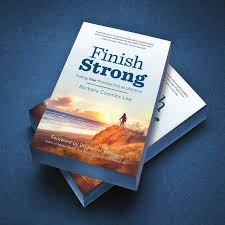'Finish Strong' To Activate Advance Directive Law’s First Provision
Nov 2, 2018 Barbara Coombs Lee Barbara Coombs Lee Author Finish Strong Finish Strong Media
 From 1991 to 1993 I served as staff to the Senate Health Care and Bioethics Committee of the Oregon legislature. The State Senator I work for wanted very much to pass one of the nation’s first advance directives laws. It was called the Oregon Health Care Decisions Act.
From 1991 to 1993 I served as staff to the Senate Health Care and Bioethics Committee of the Oregon legislature. The State Senator I work for wanted very much to pass one of the nation’s first advance directives laws. It was called the Oregon Health Care Decisions Act.
These laws are not controversial now, but at that time they were. Until the case of Nancy Cruzan it was rare to “pull the plug” and allow a permanently unconscious person to die naturally. New laws were spreading so that people could state in advance that this was what they would want. Portland’s Archbishop, William Levada, was very much opposed to the bill and the diocese’s political arm, the Catholic Conference, worked hard --- very hard --- to defeat it. The Conference succeeded in derailing it in 1991, but Senator Shoemaker re-introduced it in 1993
The Conference’s lobbyist challenged almost every word and concept in the bill. Privately, I marveled that he never attacked the sentence I considered the most radical and far-reaching in the entire bill. That was its first line, “Mentally capable people may make their own healthcare decisions.”
Those were the words that struck me as the most revolutionary. I thought those words were far more likely to disrupt conventional medicine and avert life-sustaining treatment on a regular basis. That phrase was much more wide-ranging and powerful than any allowance for the permanently comatose, which was, after all, a relatively rare occurrence.
With decades of clinical experience, I knew that sentence flew in the face of the dominant medical ethic and everyday practice. Doctors were accustomed to telling patients this test is “required,” that treatment is “necessary,” and these pills “must be taken.” They generally brooked no challenge. Patients who objected or didn’t follow through were labeled “non-compliant,” and chastised or coerced.
Of course there was lip service to autonomy, but it was not as though patients actually made truly informed decisions. Even today patients routinely “consent” to a physician’s treatment decision, with very little information and scant comparison between multiple alternatives. The idea that patients could, in fact, be the true deciders is still radical.
But no one ever asked about that first line and it slipped through unnoticed when the bill finally passed.
If patients truly made their own healthcare decisions there would be much less suffering. People facing intractable illness and declining health would choose treatments that serve their own values and beliefs and deliver maximum benefit with the least pain and inconvenience. Their decisions would enable them to end life in the comfort of home and arms of their loved ones, as most people say they would like.
I hope Finish Strong, can do its part to activate, at last, the untapped potential of that line, “Mentally capable individuals may make their own healthcare decisions,” not only in Oregon, but throughout the nation.


